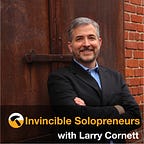
Making a living from learned skills is certainly possible. Billions of people do it every day. But that doesn't mean it's easy.
Obviously, working as an employee is how most people leverage their skills to get paid. But, you can also package up your skills, knowledge, and experience and build a business from what you do as a professional.
In some ways, this is the easiest business to create. You essentially transform your job description into a business plan. I used that approach for my first two entrepreneurial ventures. But, I never would have suspected that a layoff would give me the confidence to launch a business!
Business 1 - Copy paste your job
Like many people, I joined the corporate world after receiving my degree. I worked for IBM right after completing my Master's. Then, I joined Apple as I wrapped up my Ph.D.
While I was at Apple, I had an opportunity to join a startup. I don't think I worked there even a full year before a much larger company acquired us. Unfortunately, the "honeymoon" ended within a few months. Our new parent company absorbed our technology and patents but laid off our entire organization.
The founder and CEO relaunched the company as a new startup within a few weeks. Most of the employees rejoined that new company that was focused on a more advanced solution than what we'd created in the first startup. But I saw this as an opportunity to work with them as a consultant instead of becoming an employee again.
I was lucky enough to be working with several consultants at the company that year, and we became close friends. They encouraged me and helped guide me as I ventured into the entrepreneurial world for the first time. I don’t think I would have had the courage to make that leap without their proof that it was possible.
So, I’d like to take a moment and thank the following folks for advising and supporting me during that process:
Anke de Jong
Peter Nicklin
Kit Fitzpatrick
Joe Buczek
John Maloney
John DeBriere
My business was a solopreneur design agency offering web and application design services to tech startups. I was able to transform my talent as a designer into a full-time independent business that supported my family. Doing this is more empowering than you can imagine. It was an eye-opening experience for me.
As a design consultant, I delivered the same value to my clients that I had been providing as an employee. My very first client was this new startup (i.e., my former employer), but I started working with additional clients later that year.
Obviously, running your own business is a bit more complex than being an employee, but it's an excellent example of turning a job description into a business plan. You're still doing what you did before in your job, but now you're providing those services as an independent consultant. I wrote a bit more about this in this previous article:
You may ask, "Why bother? How is this any different from being an employee?"
Well, it is different — and I would say better — in several ways:
You're not tied to one employer. You can work with as many clients as you can handle.
You control your earning potential instead of a boss dictating your compensation. If you want a "raise" because you're good at what you do, you can increase your rates any time you want.
You can scale your business by offering higher-value services, hiring contractors or employees, and expanding your offerings.
You diversify your revenue streams, so you're not dependent on one source of income (e.g., a salary with one employer).
If you get bored with the work or a client becomes a pain, you can wrap things up and easily move on. When you have multiple clients, dropping one is no big deal.
If you're good at what you do and in demand, you can pursue new domains and projects that interest you.
Your schedule and work environment are flexible. As an independent consultant, you're supposed to be in control of how, when, and where you do your work. I was "working remotely" in 1998, long before the pandemic made remote work so popular.
You can take breaks from working whenever you want. I would enjoy weeks off between clients, take long vacations, etc., and never required the approval of some "boss." I knew one consultant who would regularly work hard for six months and then take a six-month break to travel the world every year. Good luck doing that as an employee!
Finally, you can purchase the equipment, software, and supplies you need without an employer's approval ("No, you don't really need that new MacBook. Here's a crappy standard issue Dell laptop. Enjoy!").
Business 2 - Take the best of your job
I launched my second business when I left the corporate world for the last time over 12 years ago. It kind of happened unintentionally. I assumed I would take a short break to enjoy the summer with my family and then start interviewing for my next role when I was ready to go back to work or get serious about launching my own startup (which I finally did in 2014).
I remember thinking to myself, “Maybe I should do some consulting as a side hustle.” So, I quickly designed, created, and launched a business website and let the world know through a blog post that got picked up by TechCrunch. I said:
“I am bootstrapping my own stealth startup. In parallel, today I’m launching a consulting practice to provide advisory services to other startups and more-established companies. After over eight years in the big corporate worlds of Yahoo and eBay, I’m excited about taking everything I’ve learned from my experiences at those two great companies and returning to the entrepreneurial world.”
Several people reached out to me about my consulting practice over the next few weeks, and I began working with a few clients. One thing led to another, and I finally realized that I would never go back to being an employee. I stopped interviewing.
The interesting thing about this second business is that I was able to take much of what I had enjoyed in my previous role as a Product and Design executive and offer that as services. For example:
Product and Design strategy
Organizational consulting
Business strategy and exploring revenue models
Guiding and coaching tech leaders
If you’re considering a transition to consulting from your 9-5 job, you can take the best of what you enjoy about your current role and leave the worst of it behind. When you build your business, you get to design your offering to optimize for things you’re great at doing and enjoy doing. Don’t bring the unpleasant job responsibilities forward into your new life!
My consulting company, Brilliant Forge LLC, is still running, but I rarely take on startup clients for it now. I've been focusing most of my attention on my latest business that I launched almost six years ago.
Business 3 - Base it on your talents
Making a living from what comes naturally to you almost feels effortless. When it happens, you'll hear people say, "I'm still amazed that people pay me to do this!"
I can't say that building my current coaching practice was quite this effortless for me. But discovering it was an "Aha" moment.
Several years ago, I was managing the final stages of my failing tech startup. It took a couple of years of experimentation to finally find a product that people seemed to love. Unfortunately, we were almost out of money.
We'd raised a seed round, and careful management had allowed us to hire a small team and design, build, and test our software for a few years. But, we needed an infusion of cash to keep paying the team and take our new product to the next phases of growth. Unfortunately, our investors didn't want to put more money into our startup.
So, as the CEO, I had the unpleasant task of working with our accountant and lawyer to shut down the business during the final year. It was one of the most depressing times in my life.
As things were winding down, I was trying to decide what was next for me.
Should I take a swing at launching another startup?
Should I return to the corporate world and look for a job?
Should I go back to consulting?
As always, I was discussing options with my wife to get her thoughts. She said, "Do you know what you've always been doing for as long as I can remember? Giving people career advice. Helping people find jobs. Have you considered turning that into a business?"
Now, I wouldn't literally call "career coaching" itself a natural talent. But when I looked back on my adolescence, I remembered I was always a good listener, and people came to me for advice to help them solve problems in their lives. They knew I would listen without judgment, keep the conversation confidential, and help them think through solutions.
So, perhaps my natural talents include empathy, compassion, problem-solving, and a willingness to be someone's champion. I love to help good people feel more confident, believe in themselves, and put their lives back on a good path.
Coaching people through personal and professional development was always something I loved about my job as a manager and leader. I looked forward to 1-on-1 meetings with my team. I enjoyed helping people solve problems.
I feel like my current coaching practice, Invincible Career, has allowed me to turn some of my natural talents into a business more than any of my prior companies. It’s also allowed me to lean into my talent for writing, which I appreciate.
While it is more straightforward to create a business based on your skills, knowledge, and experience, it’s fulfilling in an entirely different way to build a business that leverages your natural talents.
Your business idea
Now it's your turn. What is it you have always naturally done or been good at doing?
You may still do it now. Or, perhaps you did it frequently during your childhood but gave it up when you pursued a career based on your education and training instead.
How does your natural talent or behavior help solve other people's problems? Approaching it from the other side — what problems do people have that could be addressed by what you naturally do?
Who are the people that need your help the most? In other words, who are your ideal clients?
Are they willing to pay you to help them solve their problems? The only way to really find out is to test your business concept. You don't have to go all-in or spend much money. Take a Lean approach and test your MVP with a few potential clients.
I did precisely that with my coaching practice. I added a new services page to my existing website and put the word out that I was offering leadership and career coaching. Within a week or so, I landed my first client. I kept refining my coaching practice as the months and years went by, and the rest is history.
If someone is interested in your goods or services and willing to pay you for them, you're onto something! You have a potential business waiting to be explored.
Once you’re independently able to make a living from your talents, you’ll never want to go back to working for someone else. Are you ready to find out how that feels?
I wish you the best of luck! Feel free to reach out if you need advice or guidance.
Larry Cornett is a leadership coach and business advisor. If you’re interested in starting your own business or side hustle someday (or accelerating an existing one), check out his “Employee to Solopreneur” course (launching later this year).
Larry lives in Northern California near Lake Tahoe with his wife and children, and a gigantic Great Dane. He does his best to share advice to help others take complete control of their work and life. He’s also on Twitter @cornett.












